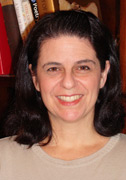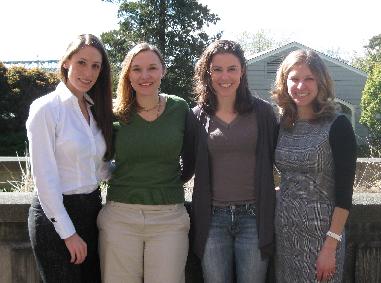| Description of the Project | |
| More about the Science | |
| Preliminary Findings | |
| Current Findings | |
| Project Timeline | |
| People on the Project | |
| Family Newsletters | |
| Paws on Science at PSC | |
| Keep in Touch! | |
| Home | |
 |
Principle Investigator: Dr. Liliana Lengua
|
Project Director: Dr. Rebecca Cortes
|
|
| Project Coordinator: Kristina Ponischil Kristina is the Project Coordinator for Projet 1, 2, 3, Go! She keeps in contact with families, schedules your sessions, and answers any questions you might have. Kristina is a recent graduate from Western Washington University and received her bachelor's degree in Psychology. At Western, she was a research assistant for a team working with preschool children and their families. Kristina is very excited to be part of Project 1, 2, 3, Go! and looks forward to speaking with you! Feel free to be in touch! |
|
 |
Graduate Students Stephanie Fengler Thompson: "My research interest concerns child adjustment in the face of ecological stressors. I am most interested in understanding how the interaction of child characteristics (temperament) and parenting behaviors predict trajectories of resilience (as conceptualized by emotion regulation, coping, etc.). This line of research is ultimately intended to examine potential interventions that might curb child psychopathologies and promote adaptive behaviors in children and parents." Lyndsey Moran: "My research interests involve identifying factors, both social and cognitive/emotional, that effect a child’s risk for future development of psychopathologies. Specifically, I am interested in understanding how a child’s level of effortful control may play into his/her successful development." Maureen Zalewski: "Studying differences between children's emotion regulation abilities fascinates me. I plan to continue studying this in children from a diverse range of family backgrounds, using both physiological and behavioral measures. I want to learn how emotion regulation differences relate to children's overall emotional well-being." Cara Kiff: "My primary research interest is in the development of anxiety and depression in children. To explore this question I have looked at the interaction of children’s temperament characteristics and parenting behaviors to predict changes in anxiety and depression symptoms in preadolescent children. Now, I am looking to build on this work by examining how emotional dysregulation in preschool children relates to parenting behaviors, and in turn predicts the early development of psychopathology. Research has demonstrated that children’s biological-based emotional reactivity, or temperament, and parenting behavior each contributes to the development of problems. My interest is in understanding how these two factors shape each other over time to affect children’s development. In a second line of research I am interested in understanding the role of broader contextual factors (e.g., family income) in the development of psychopathology. I have been working to understand how exposure to adversity across childhood and adolescence predicts the development of problems in childhood through adulthood."
|
Undergraduate Students At Project 1, 2, 3, Go! our research assistants are typically undergradute students or recent graduates at the Univerity of Washington. At the beginning of Fall and Spring quarters, we train new research assistants to come on board and work with your families. Research assistants meet with families, collect and code data, and keep our project running! Our students love being part of Project 1, 2, 3, Go! and find it very rewarding. Meeting your families gives all of our research assistants a new perspective on children, families, and builds our compassion! Our team has grown significantly since the beginning of our project. We currently have a team of experimenters, coders, and physio managers. |
|
The experimenters are the research assistants that meet and work directly with your families. They run the sessions when you come in for your visits, and do everything they can to make sure you are having a great experience. We currently have 23 experimenters that are so excited to be working with you! |
|
Our parent-child coding team consists of about a dozen individuals who have been enjoying watching you and your child interact in play and structured tasks. It’s especially fun to see how the children grow and change every time they return to the lab! We have an additional team of 10 people who watch the videos of your child individually performing our structured tasks. The children have been working so hard to complete all of our activities and are a delight to watch! |
|
Our physio team is made up of 7 research assistants who work with the physiological data we collect during the session. When you come in for your visits, we measure your child’s heart rate and sweat activity so we can learn more about the physiology behind self-regulation. The physio team also works with the saliva samples that you return after completing your visits. |
|
We’re so happy to have such a great team! |
|